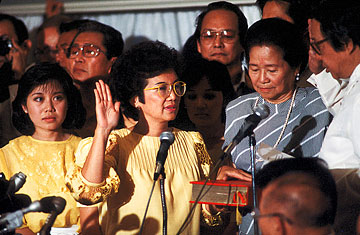
Aquino was triumphantly sworn in 10 months earlier on Feb. 25
(2 of 2)
But politicians and the public have also distorted People Power, using its catalyzing effect not to overthrow dictators but to dissolve democracies. A second EDSA uprising in 2001 against elected President Joseph Estrada cheapened the impact of its noble forerunner. Similarly in Thailand three years ago, an elected — if divisive — Prime Minister was forced out by massive street rallies that culminated in a military coup. In a perverse reworking of history, the Thai putsch's supporters dubbed it a victory for People Power. Later, in a bid to reclaim the leadership their side lost in another set of elections, the so-called People's Alliance for Democracy took over Bangkok's international airport, dealing a body blow to Thailand's vital tourism industry. Since then, yellow- and red-shirted supporters of two political camps have taken turns occupying the government, and international visitors continue to stay away. Instead of relying on the sanctity of the ballot box, a disenchanted citizenry is finding it easier to simply swarm the streets to foment regime change. The line between mob rule and People Power, it turns out, is dangerously thin.
The warping of an ideal must have distressed Aquino, who was one of the few opposition leaders to succeed as commander in chief. Just three days after a pair of Marcos allies defected from his camp because of the egregiously rigged electoral result that favored a decaying dictator over Aquino, Asia's first female President was sworn in. At the time, Cory Aquino took office as little more than a symbol: the grieving widow of opposition politician Benigno (Ninoy) Aquino Jr., who was gunned down at the Manila airport just moments after returning from exile in the U.S.
But after a rocky beginning and a slew of attempted coups, Aquino evolved into a President who merited her six years in office. She did so not as the devout Catholic whose impassioned rhetoric inspired EDSA, but as an administrator driven by a more Protestant industriousness. In the end, her tenure was nothing more than a brick-by-brick laying of democracy's foundation. That, though, was more than enough. Look at what happened, by contrast, to other figureheads of peaceful resistance: Poland's Lech Walesa, for instance, fumbled so badly after taking office that he lost a bid for re-election. (A further attempt to regain power elicited just 1% of the Polish vote.)
Half the Battle
Aquino also understood, like nelson mandela, that the enduring success of People Power depends upon the leaders it thrusts into office knowing how to make a graceful exit. Even though the Filipino electorate would surely have granted her another presidential term, she anointed a political successor, Fidel Ramos, and eased into retirement. Yet Aquino's example has not been fully followed in her homeland, where another woman President, Gloria Macapagal Arroyo, has taken advantage of electoral loopholes to elongate her tenure. Far worse are the Robert Mugabes of the world, once genuine heroes who long outlived their welcomes. Aquino's rare gift was to realize that People Power was only half the battle. Equally important was knowing when to relinquish that power bestowed by the people.
Cory's wisdom — she was, after all, one of the few leaders who was so beloved that her supporters often dispensed with her last name — will be all the more crucial at this juncture in history. Democracy, if only in name, has touched much of the developing world. But the legacy of People Power is constantly threatened by the repressive actions of those who later claim to represent it, from Pakistan and Iran to the Philippines itself. Aquino, in her helium-inflected voice, once mused: "I came to power peacefully, so shall I keep it." Like much of what Cory said, this idea — that power comes as much from the consent of the governed as the barrel of a gun — seems a simple insight. But in the world today, it remains nothing short of revolutionary.
